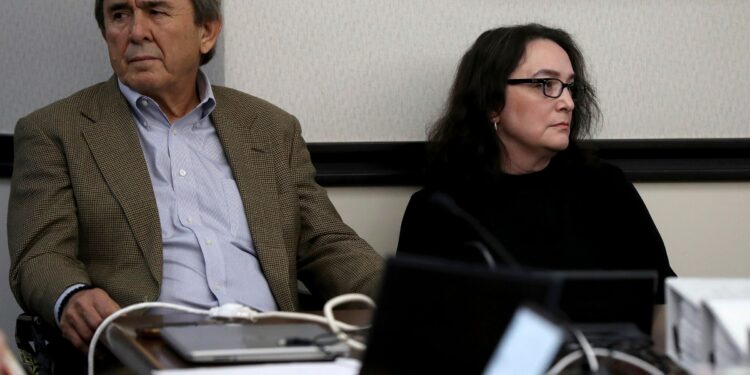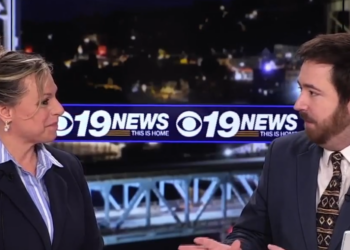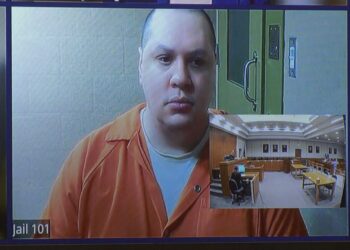(CNN) — They ignored signs of their teenage son’s failing mental health. They missed his issues in school. And they allowed him access to the family’s guns, which he used to carry out a devastating school shooting.
Those are some of the key allegations made in a Galveston, Texas, courtroom in a civil trial against the parents of Dimitrios Pagourtzis, who as a 17-year-old student in 2018 fatally shot 10 people at Santa Fe High School.
A jury tasked with determining if the parents are liable for negligence began its deliberations on Friday.
The allegations against Antonios Pagourtzis and Rose Marie Kosmetatos are altogether similar to the ones against Jennifer and James Crumbley, who earlier this year became the first parents to be charged and convicted of a crime for the Michigan school shooting carried out by their son Ethan in 2021.
The trials are in different states (Texas v. Michigan) and have far different stakes (civil v. criminal), but they feature the same essential question: Could the shooter’s parents have prevented this massacre?
“In any of these cases, you’re asking a jury to hold parents accountable for the actions of another person,” said Misty Marris, a trial lawyer who has followed both cases. “It’s something the Crumbley case has shown can be successful.”
The two cases are part of a growing push to try to find some version of accountability for the spate of American school shootings that have become more common in recent years. For teenage shooters, it has meant a renewed focus on how they gained access to firearms and what their parents did or knew beforehand.
“There’s certainly a movement where, (because) both (Crumbley) parents were held criminally responsible for their son’s actions in a mass school shooting, (that has caused) other states and other jurisdictions to look at legal cases that could hold parents accountable in a similar way,” Marris explained.
What the Texas trial is about
The trial of the Pagourtzis parents comes more than six years after Dimitrios Pagourtzis fatally shot eight students and two teachers at Santa Fe High School, about 30 miles southeast of Houston. He was arrested afterward and admitted to the shooting, police said.
Authorities said he used a shotgun and revolver legally owned by his parents in the attack.
He was charged with capital murder, but the case was put on hold after he was declared incompetent to stand trial, according to The Associated Press.
The plaintiffs in the lawsuit include family members of six of the eight murdered students and the family of a murdered teacher, along with four survivors injured in the shooting.
The lawsuit alleges the parents were negligent in allowing their son access to the firearms used in the shooting and in failing to get mental health counseling for him.
The parents testified they didn’t see any warning signs ahead of the shooting, and they had locked up their firearms before the shooting.
The parents have not faced criminal charges. Under Texas law, making a firearm accessible to a child is a crime, but “child” is defined as younger than 17 years old, and investigators would have to prove the person “failed to secure the firearm.”
The lawsuit is the first related to a school shooter’s parents to reach trial since the parents of Ethan Crumbley were convicted of involuntary manslaughter and sentenced to 10 to 15 years in prison this spring. Prosecutors had alleged James and Jennifer Crumbley were “grossly negligent” because they ignored signs of their son’s mental health issues and got him a gun days before the fatal shooting.
Ethan Crumbley, 15 at the time, fatally shot four classmates and wounded six others and a teacher at Michigan’s Oxford High School in November 2021. He pleaded guilty to one count of terrorism causing death, four counts of first-degree murder and 19 other charges, and he was sentenced to life in prison without parole.
The focus on parental negligence
In closing arguments Friday in the Pagourtzis case, plaintiffs’ attorney Clint McGuire highlighted signs the shooter’s parents knew he was having mental health problems — and that they improperly secured their guns.
“What we can agree upon is that if parents know a child has a mental illness, whether it’s depression, anxiety, whatever kind of mental illness it is, it’s that parent’s job to get that child help,” he said.
McGuire pointed to emails in which the parents discussed their son’s struggling health, as well as their own testimony.
They said “that they knew something was wrong, but they did not know how to fix it,” McGuire said. “They did nothing.”
McGuire in his closing said the shooter had incurred 57 absences at school, was failing courses, and was seen by classmates to be unhygienic and clearly struggling to take care of himself. And 18 days before the shooting, he publicly posted a picture of himself in a “Born to Kill” t-shirt.
“And after all of this, they didn’t safely store their guns,” he said. “They did not get him help.”
Those arguments are similar to the prosecution’s case against James and Jennifer Crumbley in their separate criminal trials. Prosecutors in that case argued the parents purchased and improperly stored the firearm used in the shooting, even as they dismissed concerns about their son’s mental health.
“Despite her knowledge of his deteriorating mental crisis, despite her knowledge of his growing social isolation, despite the fact that it’s illegal for a 15-year-old to walk into a gun store and walk out with a handgun by himself, this gun was gifted (to him),” Oakland County assistant prosecutor Marc Keast said in opening statements of Jennifer Crumbley’s trial.
In James Crumbley’s trial, Keast similarly said he was “grossly negligent” because he purchased a firearm for his son four days before the attack and failed to secure it even though he knew his son was in a downward spiral.
“That nightmare was preventable and it was foreseeable,” Keast said.
Parents said they simply didn’t know
The Pagourtzis parents’ defense arguments were somewhat similar to the Crumbley parents’ arguments as well: They just didn’t know.
In opening statements for the Pagourtzis parents, the defense attorney placed blame on their son for carrying out the shooting, on the school for failing to identify his issues and on the gun company that sold him ammunition online.
“There weren’t any red flag warnings,” attorney Lori Laird said. Their son had not had any run-ins with police, had no issues with alcohol or drugs and no serious discipline at school, she said.
In her closing argument, Laird emphasized Dimitrios Pagourtzis’s mental illness and sought to refocus the blame on the shooter himself.
“Their son got a mental illness. Their son is robbed of who he was,” Laird said. “He is no longer the son that they raised.”
“The parents didn’t pull the trigger,” she said. “The parents didn’t give him a gun.”
At trial, Antonios Pagourtzis took the stand in his own defense, testifying he did not know about his son’s mental health issues, according to CNN affiliate KTRK. He stated he locked up the family firearms with a key.
“Is it your position to this jury that you still bear absolutely no responsibility for the horrible tragic events on May 18, 2018?” attorney Robert Torres asked.
“Yes,” Antonios Pagourtzis said.
The shooter’s mother, Rose Marie Kosmetatos, also testified she had no reason to suspect anything was wrong before the shooting.
“Looking back, it’s very hard because you look back and everyone’s rearview mirror, you can look back, and hindsight is 20/20,” Kosmetatos said, according to KTRK. “At that time, no, there was no outward reason to think he would ever do anything.”
In the Crumbley cases, the attorneys for both parents similarly blamed their son for the shooting and the school for failing to tell them about his mental health problems.
“Can every parent really be responsible for everything their children do, especially when it’s not foreseeable?” Jennifer Crumbley’s attorney Shannon Smith said in closing arguments.
“You will not hear that James Crumbley knew what his son was going to do,” James Crumbley’s attorney Mariell Lehman said in opening statements of his trial. “You will not hear that James Crumbley even suspected that his son was a danger.”
Further, while James Crumbley did not testify, Jennifer Crumbley took the stand and expressed no regret for her actions.
“I’ve asked myself if I would have done anything differently, and I wouldn’t have,” she testified.
The-CNN-Wire
™ & © 2024 Cable News Network, Inc., a Warner Bros. Discovery Company. All rights reserved.










